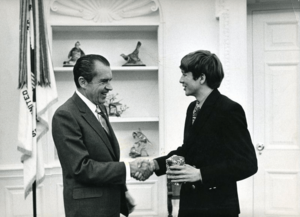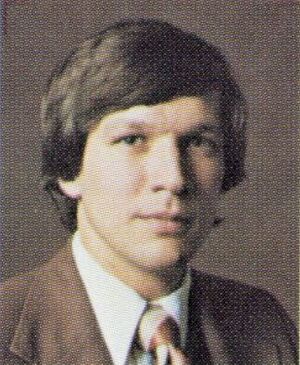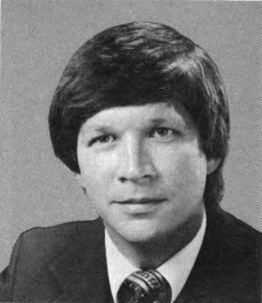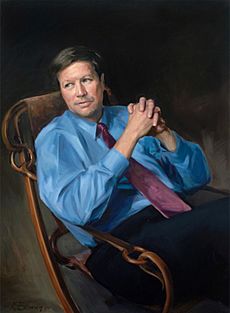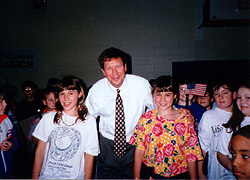John Kasich facts for kids
Quick facts for kids
John Kasich
|
|
|---|---|
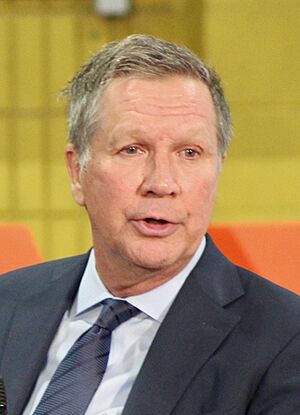
Kasich in 2018
|
|
| 69th Governor of Ohio | |
| In office January 10, 2011 – January 14, 2019 |
|
| Lieutenant | Mary Taylor |
| Preceded by | Ted Strickland |
| Succeeded by | Mike DeWine |
| Chair of the House Budget Committee | |
| In office January 3, 1995 – January 3, 2001 |
|
| Preceded by | Martin Olav Sabo |
| Succeeded by | Jim Nussle |
| Member of the U.S. House of Representatives from Ohio's 12th district |
|
| In office January 3, 1983 – January 3, 2001 |
|
| Preceded by | Bob Shamansky |
| Succeeded by | Pat Tiberi |
| Member of the Ohio Senate from the 15th district |
|
| In office January 1, 1979 – January 1, 1983 |
|
| Preceded by | Robert O'Shaughnessy |
| Succeeded by | Richard Pfeiffer |
| Personal details | |
| Born |
John Richard Kasich Jr.
May 13, 1952 McKees Rocks, Pennsylvania, U.S. |
| Political party | Republican |
| Spouses |
Mary Lee Griffith
(m. 1975; div. 1980)Karen Waldbillig
(m. 1997) |
| Children | 2 |
| Education | Ohio State University (BA) |
| Signature | |
John Richard Kasich Jr. (born May 13, 1952) is an American politician and author. He served as the 69th governor of Ohio from 2011 to 2019. Before that, he was a member of the U.S. House of Representatives for Ohio from 1983 to 2001. As a member of the Republican Party, he ran for president in 2000 and 2016.
Kasich was born in McKees Rocks, Pennsylvania, and moved to Ohio for college. He was elected to the Ohio Senate for one term before serving nine terms in the U.S. House of Representatives. In Congress, he was known for his work on the national budget. He helped pass the Balanced Budget Act of 1997.
After leaving Congress, Kasich hosted a show on Fox News and worked for the investment bank Lehman Brothers. In 2010, he was elected governor of Ohio and was re-elected in 2014. As governor, he could not run for a third term in 2018.
Kasich is known for being a critic of former President Donald Trump. He endorsed the Democratic nominee Joe Biden for president in 2020. After his time as governor, he worked as a contributor for CNN and later for NBC News.
Contents
Early Life and Education
John Richard Kasich Jr. was born in McKees Rocks, Pennsylvania, a suburb of Pittsburgh. His parents, Anne and John Kasich, were the children of immigrants from the Czech Republic and Croatia. His father was a mail carrier.
Kasich moved to Columbus, Ohio, in 1970 to attend Ohio State University. As a freshman, he wrote a letter to President Richard Nixon about his concerns for the country. He was surprised when he was invited to the White House for a 20-minute meeting with the president.
In 1974, Kasich graduated with a Bachelor of Arts degree in political science. He then worked as a researcher for the Ohio Legislative Service Commission. From 1975 to 1978, he was an assistant to state Senator Buz Lukens.
Political Career
Ohio Senate
In 1978, at age 26, Kasich was elected to the Ohio Senate. He was one of the youngest people ever elected to that office. He represented the 15th district for four years. One of his first actions was to refuse a pay raise, showing his focus on saving government money.
U.S. House of Representatives
In 1982, Kasich won a seat in the U.S. House of Representatives, representing Ohio's 12th congressional district. He was re-elected eight times.
In Congress, he served on the House Armed Services Committee for 18 years. He challenged government spending that he thought was wasteful, such as the B-2 bomber program. He also helped pass the Goldwater–Nichols Act, which reorganized the U.S. Department of Defense.
Work on the Budget
In 1993, Kasich became the top Republican on the House Budget Committee. He became the committee's chairman in 1995 after Republicans won control of Congress.
He was a key leader in creating the Balanced Budget Act of 1997. This law was a major achievement because it led to the first balanced federal budget since 1969. He also helped write an important welfare reform law in 1996, which was signed by President Bill Clinton.
Governor of Ohio (2011–2019)
Kasich was elected governor of Ohio in 2010, defeating the incumbent governor, Ted Strickland. He was sworn into office on January 10, 2011.
As governor, Kasich focused on improving Ohio's economy. His administration said it turned an $8 billion budget shortfall into a $2 billion surplus in the state's "rainy day fund." He did this partly by cutting aid to local governments and cutting some taxes.
One of his most debated actions was signing Senate Bill 5, which limited the bargaining rights of public employees like teachers and firefighters. However, Ohio voters rejected the law in a referendum later that year.
Kasich also chose to expand Medicaid in Ohio under the Affordable Care Act. This decision provided health coverage to many low-income Ohioans but was not popular with some members of his own party.
He won re-election in 2014 by a large margin, defeating Democrat Ed FitzGerald.
Presidential Campaigns
2000 Campaign
Kasich first ran for the Republican presidential nomination in 1999 for the 2000 election. He ended his campaign early due to a lack of fundraising and supported George W. Bush.
2016 Campaign
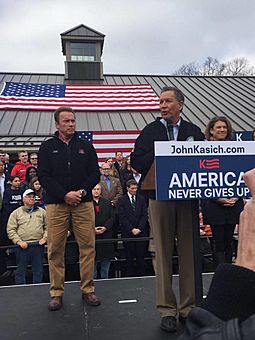
Kasich announced his second run for president on July 21, 2015. He presented himself as an experienced and optimistic candidate. He finished in second place in the important New Hampshire primary.
He won the primary in his home state of Ohio. However, he was unable to win any other states. He ended his campaign on May 4, 2016, after it became clear that Donald Trump would be the Republican nominee.
Kasich did not endorse Trump for president. He did not attend the 2016 Republican National Convention, even though it was held in Ohio.
Life After Politics
After leaving the governor's office in 2019, Kasich became a political commentator for CNN and later for NBC News. He has remained a vocal critic of Donald Trump.
In 2020, he spoke at the 2020 Democratic National Convention, where he endorsed Joe Biden for president. He said his conscience required him to speak out against Trump and support a candidate he felt could unite the country.
Kasich has written five books, including Courage is Contagious and Two Paths: America Divided or United.
Personal Life
Kasich has been married twice. He and his first wife, Mary Lee Griffith, were married from 1975 to 1980. In 1997, he married his current wife, Karen Waldbillig. They have twin daughters, Emma and Reese.
Kasich grew up Catholic but later joined an Anglican church. His faith became more important to him after his parents died in a car accident in 1987.
Images for kids
-
Kasich with Sean Hannity
-
Kasich consults with military leaders during the Gulf War.
See also
 In Spanish: John Kasich para niños
In Spanish: John Kasich para niños
- Ohio's 12th congressional district
- List of United States representatives from Ohio
- Ohio gubernatorial election, 2010
- Ohio gubernatorial election, 2014
- Republican Party presidential candidates, 2016
 | Janet Taylor Pickett |
 | Synthia Saint James |
 | Howardena Pindell |
 | Faith Ringgold |


